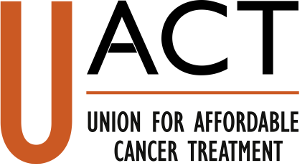On October 31, 2018 UACT sent the following letter to President Trump regarding his statements about protections for pre-existing conditions in the lead up to the midterm elections. A PDF of the letter is available here.
Union for Affordable Cancer Treatment
1621 Connecticut Avenue NW
Suite 500
Washington, DC 20009
Tel.: 202.332.2670
www.uact.org
October 31, 2018
President Donald Trump
The White House
1600 Pennsylvania Avenue NW
Washington, DC 20500
President Trump,
I am writing on behalf of the Union for Affordable Cancer Treatment (UACT) to say that we are appalled that you are now claiming that the Republican party will protect patients with pre-existing conditions.1 The reality is that you have supported litigation to end the Affordable Care Act protections for pre-existing conditions, and you are supporting measures that would allow insurers to exclude persons who are sick or charge them more.
The key to any real protection for pre-existing conditions is to ensure that everyone pays into insurance pools, and that ALL policies have robust coverage for pre-existing conditions. If healthy persons can have different insurance policies or none at all, the costs and feasibility of covering pre-existing conditions is clearly and obviously damaged.
Don’t lie to the American public about this issue.
UACT was founded in 2014 as a volunteer organization of people affected by cancer, their family members and friends, people who take care of people with cancer, health care professionals and cancer researchers committed to increasing access to effective cancer treatment and care, who share the conviction that cancer treatment and care should be available everywhere for everyone, regardless of gender, age, nationality, or financial resources. Our web page is https://cancerunion.org.
I myself am a stage IV HER2 positive breast cancer patient in active treatment since May 2010, and am extremely fortunate to have access to the most advanced cancer treatment available today. My cancer, as for many cancer patients, has become a chronic disease. It is costly and will be more and more costly for all of us as the prices of medicines and insurance increase to cover the many cancer patients living longer and longer lives.
Like many patients, caregivers, doctors, insurers and policymakers, we are extremely concerned about the rapidly escalating cost of cancer medications. Because we believe the cost of cancer treatments is already excessive and will continue to increase unless you engage in real policy reform, we are worried that any modification of the mechanisms that protect “pre-existing conditions” in the Affordable Care Act will have a deadly impact on patients and will create financial toxicity for their families.
Cancer patients and voters care about the language in the ACA that guarantees access to insurance for people who are (or have been) affected by a disease. In fact according to the Kaiser Family Foundation (KFF):
64% of the public does not want the Supreme Court to overturn the ACA’s protections for people with pre-existing conditions, and that continuing those protections tops the list of health issues registered voters say they’ll consider in supporting candidates as the midterm election approaches.
Furthermore, the KFF did a mapping of pre-existing conditions in the US and showed the following:
Estimated Share of Adults with Pre-Existing Conditions by Metropolitan or Micropolitan Statistical Area
We previously estimated using 2015 data from the Centers for Disease Control and Prevention that 27% of adults age 18-64 (52 million people) have a pre-existing condition that would have led to a denial of insurance in the individual market before the ACA. A larger share of nonelderly women (30%) than men (24%) have declinable preexisting conditions. The share of people with pre-existing conditions also varies by age, ranging from 15% for 18-24 year-olds to 47% for 60-64 year-olds.
The share of non-elderly adults with a declinable pre-existing condition ranges from one-third or more in some states (Kentucky, Alabama, Mississippi, and West Virginia) to 23% or less in others (Alaska, District of Columbia, New Jersey, Utah, Colorado, and Minnesota). […]
New estimates show the variation in the prevalence of pre-existing conditions across communities in the U.S., with substantial differences within states in some cases.
The share of non-elderly adults with a declinable pre-existing condition ranges from 41% in Kingsport, Tennessee to 20% in Logan, Utah and Rochester, Minnesota. The prevalence of pre-existing conditions can vary by 10% or more between cities in the same state. For example, in Kansas 32% of Topeka’s population has a pre-existing condition, as compared to 21% of Manhattan’s population. Similarly, in South Carolina 34% of Florence residents have a pre-existing condition, compared to 24% in Charleston or Hilton Head.2
UACT believes that the focus of health-related policies must change. We must avoid rationing of life saving medicines for patients and remove the current pressure to exclude as many patients as possible from affordable insurance policies. Instead of pursuing an agenda of promoting high prices for cancer medicines, we must design policies that provide robust and sustainable funding for research and development (R&D) through other mechanisms, including in particular, those that would delink R&D costs and funding levels from drug prices.
In this midterm election, voters will be paying attention to the GOP plans regarding the ACA and more specifically to provisions regarding prior existing conditions. You can’t just say that the GOP will protect pre-existing conditions without spelling out the policies that will determine if such protections will actually exist. So far, all we have is a track record of your support for policies that would put pre-existing conditions at risk, and no details whatsoever regarding any new plans that would change that fact.
Sincerely,
Manon Ress
manon.ress@cancerunion.org
[1] https://twitter.com/realDonaldTrump/status/1057655675080314880
[2] https://www.kff.org/health-reform/issue-brief/mapping-pre-existing-conditions-across-the-u-s/
